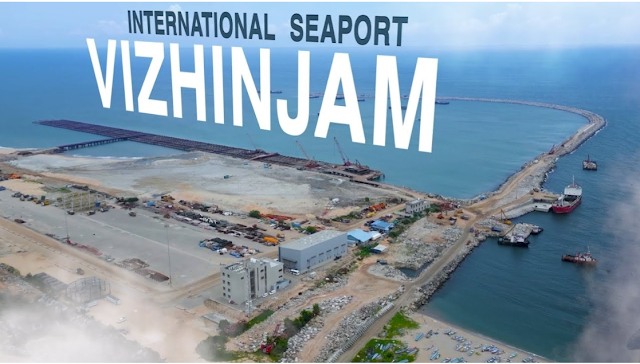Kerala's Gateway to Prosperity: Unveiling the Potential of Vizhinjam International Seaport!
 |
| Vizhinjam Seaport |
The coastline
of India stretches like a vast, untapped resource, holding immense potential
for maritime trade. However as we recognize the potential, the Vizhinjam
International Seaport in Kerala however is poised in reshaping the region's
economic landscape. With all this being kept in mind, the ambitious project,
envisioned as India's first Mega Trans-shipment Container Terminal, did present
as a unique blend of opportunities for growth and development, alongside
potential challenges that require careful consideration.
Riding
the Waves of Progress: Unveiling the Opportunities
The
Vizhinjam International Seaport is a game-changer, which heralds a new era of
economic prosperity for Kerala. Here's how:
·
Job
Creation Engine: The
project already is generated over 2,000 direct and indirect jobs in
construction, operations, logistics, and other sectors. This estimate suggest a
further surge in 5,500 jobs by 2028-29, which significantly is impacting
Kerala's employment landscape.
·
Enhanced
Trade Gateway: The
port allows it accommodating larger vessels, which facilitates a significant
increase in import and export volumes. This resulted in faster movement of
goods, reduced transportation costs, and a potential boost for local
businesses.
·
Infrastructure
Development Catalyst: The
construction of port thus has spurred with an infrastructure revolution within
the surrounding areas. Improved roads, better connectivity, and upgraded
logistics networks benefitting not just the port operations but stimulates
regional growth.
·
Tourism
Potential: The
port might act as a gateway for cruise tourism, attracting international
visitors which also generates an additional revenue streams. The scenic beauty
of Kerala, thus having been coupled the port's modern facilities, can also create
a compelling tourist destination.
·
Skill
Development Hub: The
port's operations demand a skilled workforce in various domains, such as port
management, logistics, maritime operations, and related technical vocations.
This necessitates educational institutions and training programs to equip the
local population with the necessary skills, leads more qualified and employable
workforce.
Charting
a Course Through Challenges: Navigating the Risks
With
undeniable benefits, it's likely crucial in acknowledging the potential
challenges and develop strategies to mitigate them:
·
Environmental
Impact: With
large-scale construction projects there is a high chance of disrupting the delicate
marine ecosystem. Also, one needs to take careful environmental impact
assessments, sustainable construction practices, and diligent waste management which
is essential in minimizing ecological damage.
·
Social
Disruption:
Land acquisition and displacement of local communities lead to social unrest
ensures a fair compensation, which provides a vocational training for displaced
individuals, and promoting inclusive development which is crucial in addressing
these concerns.
·
Security
Risks: With
increased maritime activity which might heighten the security concerns, there
are robust security protocols, effective surveillance systems, and cooperation
with international agencies which is essential in ensuring the safety of the port
and its operations.
·
Competition: The success of the Vizhinjam port is
due to its ability to attract business and compete with other established ports
in the region. With development of world-class facilities, offering efficient
services, and adopting innovative technologies will be vital in this regard.
·
Sustainability
Concerns: The
long-term success of the port thus far however is relied on its sustainability
plan and by investing in renewable energy sources to power port operations,
exploring green cargo handling practices, and minimizing pollution is critical
for responsible development.
There
is a huge potential for Vizhinjam International Seaport with Kerala's economic
transformation. However, with maximizing benefits and minimizing risks there is
a lot to require in comprehensive and balanced approach. Some key strategies to
include as follows:
·
Transparency
and Public Participation: Thus
with open communication the local communities regards the employment
opportunities, environmental impact assessments, and mitigation measures which
can foster trust and collaborative development.
·
Sustainable
Development Framework: The
planning and execution of the project prioritizes with environmental
safeguards, thereby providing minimal ecological disruption which promotes in
responsible resource management.
·
Investing
in Skill Development: Investment
in the skill development programs ensures the local population benefits from
the job opportunities created by the port. This will not only improve future
employment prospects but do promote inclusive growth.
·
Collaboration
is Key: Leading
maritime players collaborates with the international partners will be crucial with
attracting business, implementing best practices, and establishing the
Vizhinjam port as a major hub with the global maritime network.
Thus
the Vizhinjam International Seaport replicates standing as a beacon of
opportunity, which promises propelling Kerala towards a prosperous future. Through
navigation with associated risks responsibly and employing a sustainable
development plan, one ensures this ambitious project truly becomes a gateway in
growth, prosperity, and a brighter future for the region. Thus Kerala has a
unique opportunity in riding the waves of progress, which ensures the Vizhinjam
International Seaport becoming as a symbol of economic development in harmony
with the environment and its communities.

Comments
Post a Comment